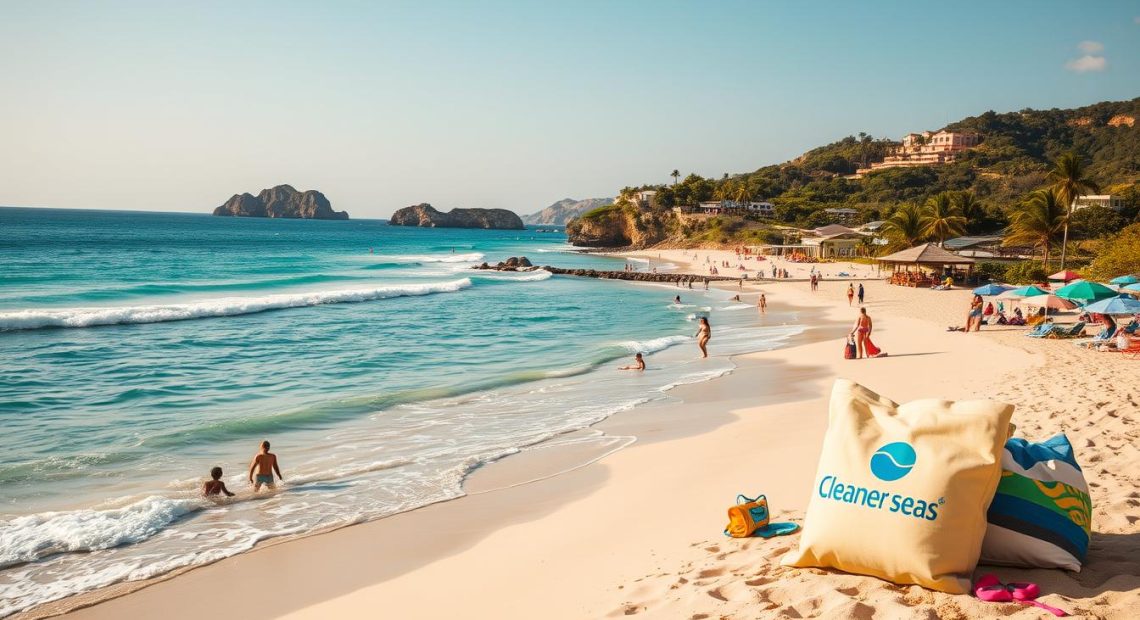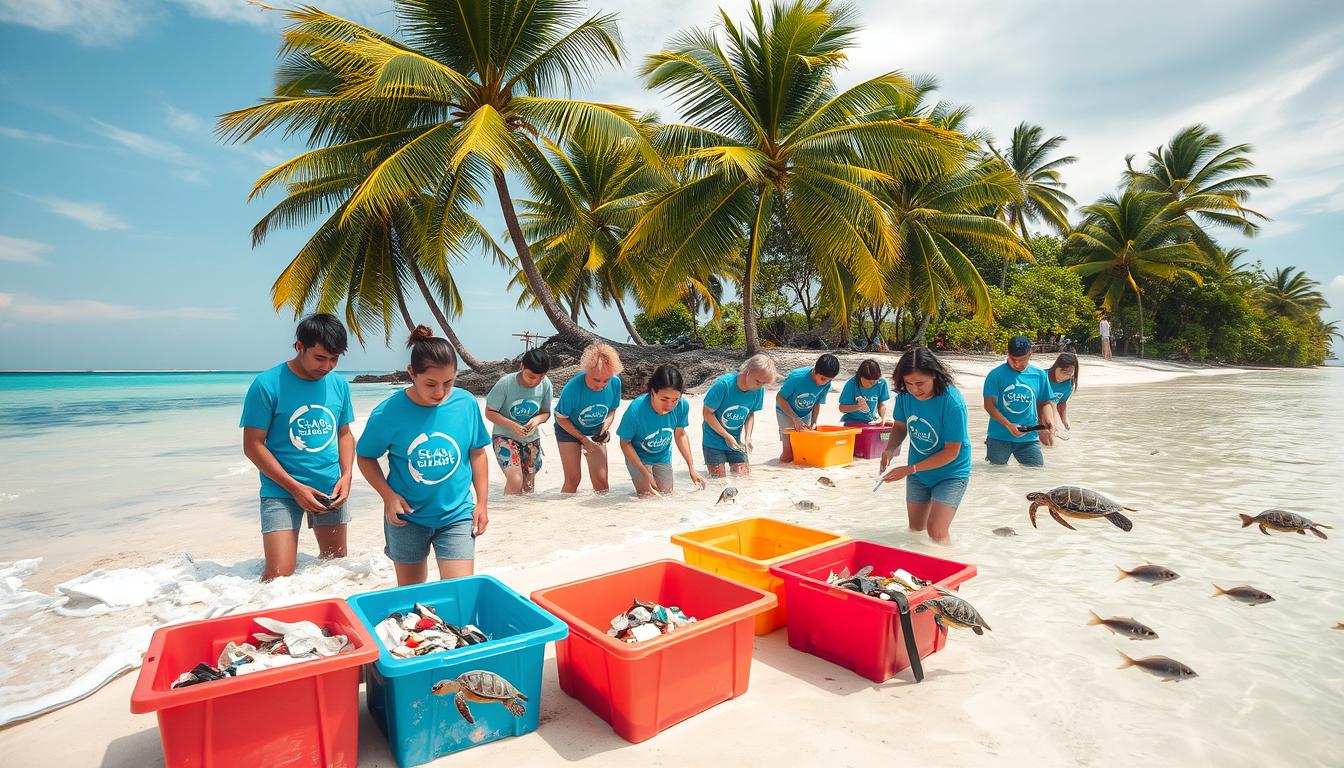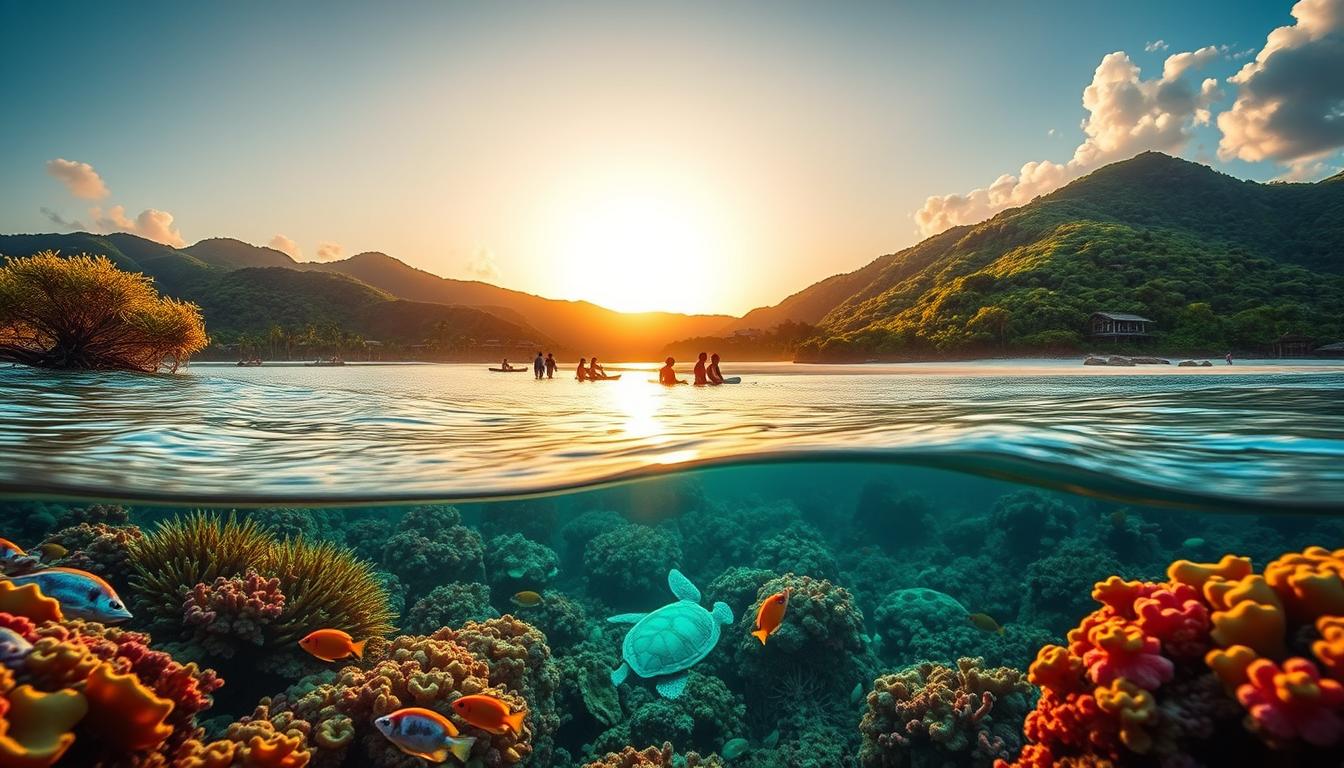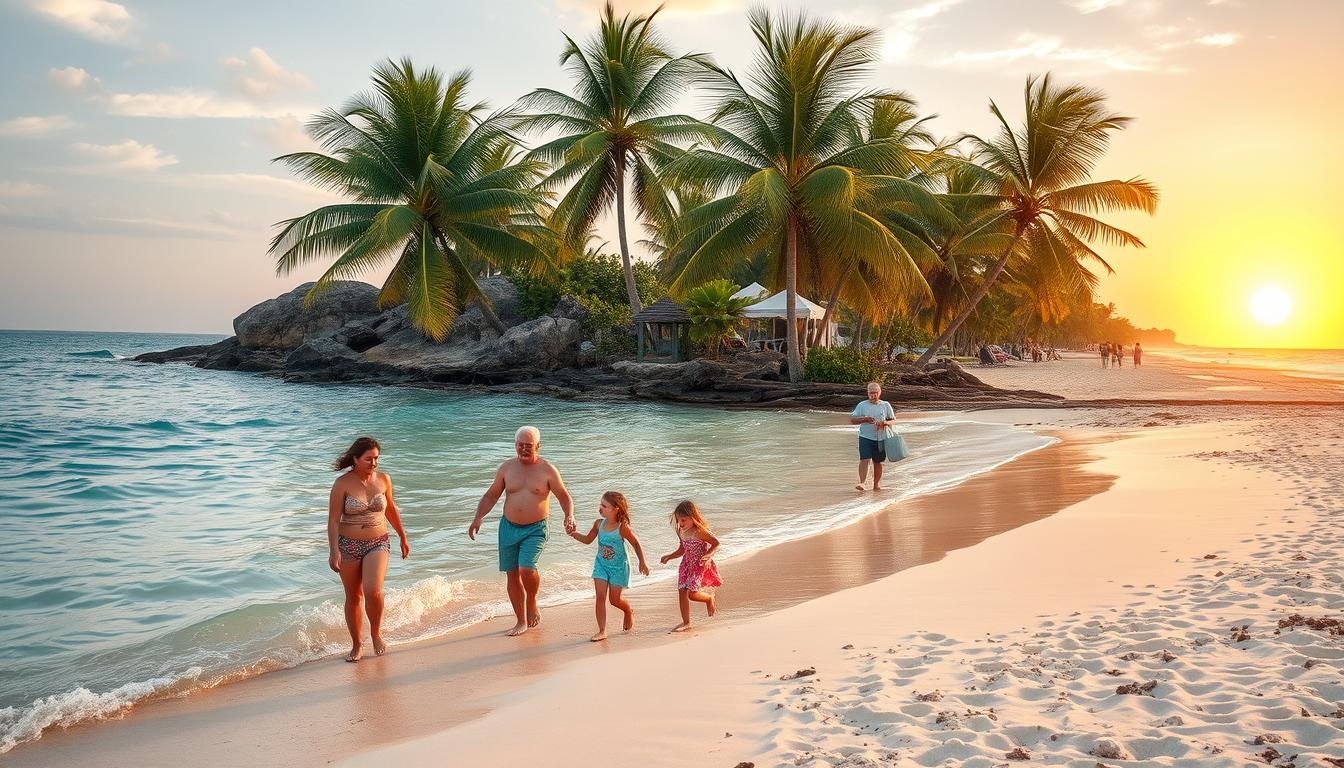Eco-Friendly Beach Destinations That Protect Marine Life

The beauty of pristine beaches and clear waters is hard to resist. Yet, tourism can harm coastal ecosystems. Eco-friendly beach destinations are now more popular. They offer a mix of relaxation and conservation, letting visitors enjoy the coast while protecting marine life.
In Indonesia, the Gili Islands have banned motorised vehicles to save marine life. Eco-lodges use solar energy, changing how we enjoy coastal trips. These efforts not only protect ecosystems but also teach visitors about marine conservation.
Many eco-friendly beaches have rules about reef-safe sunscreens, important in places like Southeast Asia and the Caribbean. Switching to reef-safe sunscreens helps protect marine life from harmful chemicals. Beach clean-ups are common, encouraging visitors to help reduce plastic pollution, a big threat to our oceans.
Key Takeaways
- Eco-friendly beach destinations prioritise marine life protection
- Sustainable tourism practices include solar power and water conservation
- Reef-safe sunscreens are key for coral ecosystems
- Beach clean-ups and eco-tours promote conservation and education
- Green travel supports local economies and preserves coastal environments
- Eco-certified water activities offer sustainable ways to enjoy the ocean
Introduction to Eco-Friendly Beach Destinations
More people are now thinking about how their travels affect the planet. Eco-friendly beach destinations are becoming more popular. They offer a mix of relaxation and helping protect marine life, so you can enjoy the beach while doing good.
Importance of Sustainability
Keeping our coastlines safe is key. Resorts are starting to use eco-friendly ways to reduce harm to the environment. For example, Bucuti & Tara Beach Resort in the Caribbean has gone carbon neutral. They also take steps to save water and reduce plastic use.
- Producing 20% of energy needs through solar panels
- Reducing water flow by 60% with low-flow fixtures
- Saving 290,000 plastic water bottles annually
- Implementing a 96% paperless operation
The Impact of Tourism on Marine Life
Regular tourism can damage marine life. But, conservation holidays are a way to help. Eco-friendly resorts have activities like beach clean-ups and caring for coral reefs. For example, Lily Beach Resort in the Maldives does regular reef clean-ups.
By picking eco-friendly beaches and joining in conservation, you can enjoy the coast while helping protect it for the future.
Top Eco-Friendly Beach Destinations in the UK
The UK has many eco-friendly beach spots for those who love the environment. These places are great for holidays that are good for the planet. They mix natural beauty with green practices, perfect for those who care about the earth.
Brighton
Brighton leads the way in green tourism. It’s full of eco-friendly projects. Visitors can enjoy the beach and help local businesses that care about the planet.
Pembrokeshire
Pembrokeshire Coast National Park is a paradise for nature fans. It’s a top spot for:
- 187-mile coastal path with stunning views
- Great for birdwatching and spotting dolphins
- Places to stay that use solar power
North Norfolk
North Norfolk’s coast is a beauty spot that cares about the environment. Holkham Beach is known as Norfolk’s best. It’s also where you can see England’s biggest grey seal colony at Blakeney Point, with over 500 seals.
These places in the UK are leading the way in green beach holidays. By visiting these spots, you help the local environment and support green tourism.
Eco-Friendly Beaches in Europe
Europe is home to some of the most beautiful coastlines. Many places are now using green practices to protect their oceans. Let’s look at three top spots for eco-friendly beach holidays.
Algarve, Portugal
The Algarve in Portugal is a leader in green tourism. It has over 100 beaches with the Blue Flag for being clean and eco-friendly. The area has strict rules on building near the coast and supports local, green businesses.
Amalfi Coast, Italy
The Amalfi Coast in Italy is known for its stunning views and commitment to the environment. Many beaches here have recycling and no single-use plastic policies. Visitors can join eco-tours to learn about the area’s nature and help conservation.
Coastal France
France’s coast offers many green beach options. In 2018, 399 French beaches got the Pavillon Bleu for being eco-friendly. For example, Torreilles beach saved 2 million litres of water by using taps instead of showers, showing off smart green ideas.
These places in Europe show that you can have a luxury holiday and be kind to the planet. They let visitors enjoy the beach without harming the environment.
Conservation Efforts in Thailand
Thailand is dedicated to protecting its marine life. It has many protected areas and community projects. Ko Mak was named one of the world’s top 100 sustainable destinations in 2022.
Marine Protected Areas
Thailand has many marine sanctuaries. The Surin Islands, a national park, are famous for their clear waters and coral reefs. These places help keep ecosystems safe and support local people through eco-tourism.

Community Involvement
Local people play a big role in Thailand’s conservation. On Koh Tao, the New Heaven Reef Conservation Program has been working hard. It offers holidays where you can help with reef restoration and giant clam surveys.
- The Salakkok-Salakphet community on Ko Chang has a 500m-long Red Bridge Walkway through mangroves
- JW Marriott Phuket works with the Mai Khao Marine Turtle Foundation to protect sea turtles
- The Thai Organic Consumer Association helps local farmers by giving organic produce to resorts
These efforts show how tourism can help the environment and local economies. By taking conservation holidays in Thailand, you can enjoy beautiful beaches and help protect marine life for the future.
Sustainable Practices in the Caribbean
The Caribbean is at the forefront of green travel. Many environmentally-friendly coastal resorts are using new methods. These efforts are making the region a model for sustainable tourism.
Eco-Resorts Paving the Way
Caribbean eco-resorts are setting high standards for sustainability. Ti Kaye Resort & Spa in St. Lucia won big at the 2024 CHIEF Awards for its green efforts. Zemi Beach House in Anguilla runs on solar power during the day, showing how hotels can use renewable energy.
Aruba is leading with its ban on single-use plastics. The Radisson Blu Aruba is a LEED-certified hotel, showing its dedication to being green. Joia Aruba by Iberostar uses prefabricated systems, cutting down on environmental harm.
Reef Restoration Initiatives
Caribbean resorts are working hard to protect marine life. Secret Bay in Dominica, a Green Globe Certified resort, has a coral nursery to safeguard marine ecosystems. Atlantis Paradise Island in the Bahamas works with the Atlantis Blue Project Foundation to help with conservation.
- Banyan Tree Bimini Resort plans to feature an artificial reef structure
- COMO Parrot Cay in Turks and Caicos offers tree planting for guests
- Big Blue Collective uses eco-friendly four-stroke outboard motors
These efforts show the Caribbean’s commitment to its natural beauty and responsible tourism. For those looking for green travel, the Caribbean offers a mix of sustainability and beauty.
The Role of Eco-Tourism in Marine Protection
Eco-tourism is key in protecting our oceans. It combines sustainable tourism with unique travel experiences. This way, it helps protect marine ecosystems.
Raising Awareness
Conservation holidays teach visitors about marine life’s value. They learn oceans produce half our oxygen, showing their importance. These experiences motivate guests to support ocean protection.
Supporting Local Economies
Sustainable tourism boosts jobs and local economies in coastal areas. It encourages communities to protect their resources. For example, some places see a 20-30% increase in fish biomass in Marine Protected Areas.
Eco-tourism also preserves traditional practices. In some places, over 50% of local communities see a decline in sustainable fishing due to mass tourism. But, responsible travel supports these practices, keeping cultural heritage and the environment safe.
- Volunteer programmes attract thousands of participants yearly for beach clean-ups and reef restoration.
- Eco-friendly accommodations minimise their environmental impact.
- Sustainable tour operators prioritise marine life protection in their activities.
By choosing conservation holidays, travellers help protect our oceans. This partnership between tourism and conservation leads to a sustainable future for our oceans.
Eco-Friendly Activities to Enjoy at the Beach
Green travel lovers can have a blast at the beach without harming it. Beaches are vital for protecting our coasts. So, it’s key to travel sustainably to keep them safe.
Snorkelling and Diving
Snorkelling and diving are great for seeing marine life while being kind to the ocean. It’s important to pick tour operators who care about the sea. Sadly, up to 14,000 tonnes of sunscreen harm coral reefs each year.
Beach Clean-Up Initiatives
Joining beach clean-ups is a fulfilling way to help our coasts. Over 30 years, the Ocean Conservancy has collected over 300 million pounds of trash. In 2021, 26 billion pieces of rubbish were found on US coasts, mostly from snacks.
Green travel fans can also make eco-friendly choices at the beach:
- Use reef-safe sunscreen to protect marine life
- Bring reusable water bottles to reduce plastic waste
- Choose bottled sunscreen over aerosol cans to minimise air pollution
- Support local eco-friendly businesses and accommodations
By doing these things, we can enjoy the beach and help protect it at the same time.
Benefits of Eco-Friendly Beach Destinations
Choosing eco-friendly beach destinations for your holidays is good for the environment and local communities. Sustainable tourism helps keep our planet beautiful and its culture alive.
Protecting Biodiversity
Eco-friendly beach spots focus on saving marine life. By visiting these places, you help protect delicate ecosystems. Many coastal resorts now cut down on plastic and energy use, making the sea cleaner for marine life.

Conservation holidays let you help local wildlife. You can join beach clean-ups or help fix reefs. This way, you directly help protect marine habitats.
Enhancing Local Culture
Sustainable tourism also helps keep local traditions alive. By picking eco-friendly spots, you get to see real cultural experiences and support local businesses. This creates jobs and helps communities keep their heritage.
“Over 80% of travellers confirm that sustainable tourism is important to them.”
Eco-friendly beach resorts share local food, crafts, and customs. This gives visitors unique experiences. By connecting with these aspects, tourists make their travel more meaningful and responsible.
- Support local economies through sustainable tourism
- Preserve cultural traditions and heritage
- Reduce environmental impact on fragile coastal ecosystems
- Create deeper connections with local communities
By choosing eco-friendly beach destinations, you can have amazing holidays. You also help make these beautiful coastal areas sustainable for the future.
How to Choose an Eco-Friendly Beach Destination
Choosing Ethical Beach Getaways needs careful thought. When planning your seaside holiday, look for Environmentally-Friendly Coastal Resorts that match your values. Here’s how to pick a beach break that supports the planet.
Researching Local Practices
Before you book, check the environmental policies of your options. Seek out resorts that focus on conservation and sustainable living. For example, some hotels reduce their carbon footprint or use green energy.
- Check if the resort uses solar power or other green energy
- Inquire about waste management and recycling programmes
- Look for properties that support local communities and ecosystems
Certifications to Look For
Look for eco-certifications to guide your choice. These awards show a commitment to protecting the environment and promoting sustainable tourism.
- Green Globe: Recognises sustainable tourism operations worldwide
- Blue Flag: Awarded to beaches meeting strict environmental criteria
- EarthCheck: Benchmarks sustainability performance in travel and tourism
By picking Environmentally-Friendly Coastal Resorts with these certifications, you support businesses that care for the planet. Remember, your holiday choices can greatly help protect our coastlines for the future.
The Best Time to Visit Eco-Friendly Beaches
When planning a trip to eco-friendly beaches, think about the seasons and wildlife. Sustainable tourism means visiting at the right time. This way, you can enjoy your trip without harming the environment.
Seasonal Weather Patterns
Weather changes from place to place. For example, Brighton Beach in the UK is lovely in summer. In Thailand, the best time to visit marine protected areas is from November to April.

Wildlife Spotting Opportunities
For those who love wildlife, timing is everything. In the Algarve, Portugal, dolphin watching is best from May to October. The Caribbean is great for turtle watching from March to November. Always remember to watch wildlife responsibly.
- Whale watching in coastal France: June to November
- Sea turtle nesting in Thailand: February to September
- Coral spawning in the Great Barrier Reef: November to December
Traveling during off-peak times can help the environment. Visiting the Amalfi Coast in spring or autumn is less crowded. Choosing the right time makes your trip more sustainable and enjoyable.
Future Trends in Eco-Friendly Beach Tourism
Beach tourism is changing fast, with a focus on green travel and sustainable tourism. New developments are making coastal trips better for the future.
Technology in Conservation
New tech is changing how we protect marine life. AI watches over coral reefs, and smart waste solutions help clean up pollution. These tools are key to keeping our beaches healthy for years to come.
The Rise of Eco-Conscious Travellers
More people are choosing to travel in a way that’s good for the planet. A 2022 report found 81% of travellers value sustainable travel. This change is making beach spots work harder to be eco-friendly.
- Eco-certified hotels are more popular
- Traveling during off-peak times is becoming common
- Activities like hiking and wildlife tours are growing
The beach tourism market is expected to grow from £187.22 billion in 2024 to £259.19 billion by 2029. This growth is mainly because of eco-tourism and nature-based travel. As the industry grows, we’ll see even more green practices and a focus on keeping our coasts beautiful.
Conclusion: The Importance of Choosing Green Destinations
Choosing where we holiday can greatly affect our planet. The trend of eco-friendly beach destinations is growing. It shows a shift in how we travel.
The eco-tourism market is expanding fast, at 14% a year. This shows more people want sustainable travel options.
The Ripple Effect of Responsible Tourism
Choosing green destinations has a positive effect. Costa Rica protects 25% of its land, showing its commitment to nature. This helps preserve biodiversity and sets an example for others.
Iceland is another great example. It gets 99% of its electricity from green sources. This shows eco-friendly practices can work on a big scale.
Encouraging Sustainable Travel Choices
We have the power to make a difference as travellers. A survey found 87% of people think sustainable travel is key. And 61% are ready to change their plans to help the environment.
This change in thinking is vital. It pushes more places to be eco-friendly. By picking carbon-neutral beach escapes, we support a greener future in tourism.
FAQ
What makes a beach destination eco-friendly?
How does choosing an eco-friendly beach destination benefit marine life?
What are some popular eco-friendly beach destinations in the UK?
Are there eco-friendly beach options in Europe?
How can I participate in marine conservation during my beach holiday?
What eco-friendly activities can I enjoy at sustainable beach destinations?
How do I choose a truly eco-friendly beach resort?
What is the best time to visit eco-friendly beaches?
How does eco-tourism support local economies?
What are some emerging trends in eco-friendly beach tourism?
Source Links
- https://www.introtravel.com/travel-blog/eco-friendly-beach-travel/ – Sustainable Beach Travel: Preserving Paradise for Future Generations
- https://www.wtravelmagazine.com/7-luxury-eco-resorts-that-are-protecting-the-ocean/ – Island Resorts Protecting The Oceans
- https://green-travel-blog.com/sustainable-beach-vacation-tips-and-eco-friendly-accommodation/ – Sustainable beach vacation – Tips and eco-friendly accommodation
- https://www.travelmatters.co.uk/blog/maldives-eco-conscious-resorts – The Maldives and its Eco-conscious Resorts — Travel Matters
- https://www.greenpearls.com/hotels/f/types/beach-hotels/ – Green Pearls® | Eco Beach Hotels, green Resorts & Lodges, worldwide
- https://www.bucuti.com/resort/eco-friendly – Eco Friendly – Carbon Neutral | Bucuti and Tara Beach Resort
- https://www.roughguides.com/articles/uks-top-eco-attractions-and-activities/ – UK’s top eco attractions and activities | Rough Guides
- https://www.best-of-scotland.com/blog/the-uks-best-ecotourism-spots/ – The UK’s Best Ecotourism Spots | Best Of Scotland
- https://www.euronews.com/travel/2024/03/14/greece-cyprus-uk-seven-of-the-worlds-top-10-best-sustainable-beaches-are-in-europe – Europe dominates ranking of the world’s best sustainable beaches
- https://www.vilebrequin.com/eu/en/magazine/destinations/blog_article-top10-beaches.html – TOP 10 MOST BEAUTIFUL ECO-FRIENDLY BEACHES
- https://impact.economist.com/projects/eco-conscious-tourism-in-thailand/thailand-beach-holidays-with-a-conscience/ – Thailand beach holidays with a conscience
- https://thaiadventureclub.com/eco-tourism-in-thailand/ – Eco tourism in Thailand – Thai Adventure Club
- https://voyeglobal.com/sustainable-tourism-thailand/?srsltid=AfmBOordU8EPnYZJOwHoZ0ROoZuqswAAQUdIrcZ6wpqMNcq7rwSQ_9Jz – Sustainable Tourism in Thailand: A Responsible Travel Guide
- https://www.travelagewest.com/Travel/Caribbean/eco-hotels-caribbean – How to Travel More Sustainably in the Caribbean
- https://ciu.gov.kn/st-kitts-and-nevis-named-top-caribbean-eco-friendly-sustainable-destination/ – Caribbean Eco-Friendly Sustainable Destination
- https://instituteofsustainabilitystudies.com/insights/lexicon/how-responsible-tourism-can-aid-marine-life-conservation/ – Marine conservation: How responsible tourism can drive change
- https://www.frontiersin.org/journals/marine-science/articles/10.3389/fmars.2022.1002677/full – Frontiers | Ecotourism in Marine Protected Areas as a tool to valuate natural capital and enhance good marine governance: A review
- https://link.springer.com/chapter/10.1007/978-3-319-71064-8_103-2 – Sustainable Coastal and Marine Ecotourism: Opportunities and Benefits
- https://greenly.earth/en-us/blog/industries/5-ways-to-make-your-beach-day-eco-friendly – 5 Ways to Make Your Beach Day Eco-Friendly
- https://www.nationalgeographic.com/travel/article/6-tips-to-make-your-next-beach-trip-more-sustainable – 6 tips to make your next beach trip more sustainable
- https://www.gstcouncil.org/what-is-sustainable-tourism/ – What is Sustainable Tourism?
- https://www.gooverseas.com/blog/benefits-of-sustainable-tourism – 7 Benefits of Sustainable Tourism & How to Travel Responsibly
- https://ecobeach.com.au/how-eco-beach-resorts-are-making-a-difference/ – Sustainable Tourism: How Eco Beach Resort Makes a Difference
- https://www.lonelyplanet.com/articles/eco-friendly-destinations – 8 eco-friendly destinations where sustainability is priority
- https://www.unsustainablemagazine.com/sustainable-beach-trip-tips/ – Sustainable Beach Trip Tips: How to be Eco-Friendly at the Beach
- https://www.ecoenclose.com/blog/the-ultimate-list-of-ecofriendly-environmental-holidays-a-guide-to-green-holidays/?srsltid=AfmBOoqnoIA-P1_coLWo3Tknl4rX6eMhD45hzNgZiPTFusCQ9GDsrXnU – The Ultimate List of Eco-Friendly & Environmental Holidays [A Guide to Green Holidays]
- https://stephanieschuttler.com/13-tips-for-a-more-sustainable-beach-trip/ – 14 Tips for a Sustainable Beach Trip
- https://www.savills.com/impacts/environment/new-directions-in-hospitality-eco-tourism-and-staycations-lead-the-way.html – New directions in hospitality: eco-tourism and staycations lead the way | Savills Impacts
- https://transition-pathways.europa.eu/articles/sustainable-tourism-adapting-climate-induced-holiday-trends – Sustainable Tourism – Adapting to Climate-Induced Holiday Trends
- https://blog.tbrc.info/2025/03/beach-tourism-market-growth-outlook/ – Future Outlook of the Beach Tourism Market: Growth, Trends, and Emerging Opportunities Explored – Latest Global Market Insights
- https://www.naturebuffsoap.com/blog/discovering-eco-friendly-travel-destinations-exploring-natures-hidden-gems – Explore Eco-Friendly Travel Destinations: Discover Nature’s Hidden Gems — Nature Buff Soap
- https://www.ecolivingvibes.com/sustainable-tourism/ – Sustainable Tourism: Complete Guide Will Make You Rethink Travel















